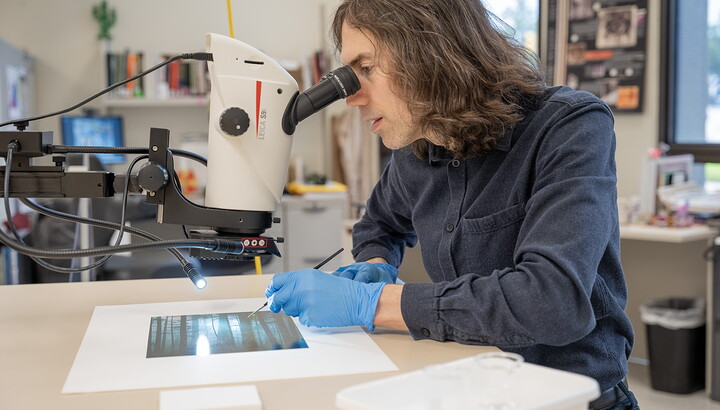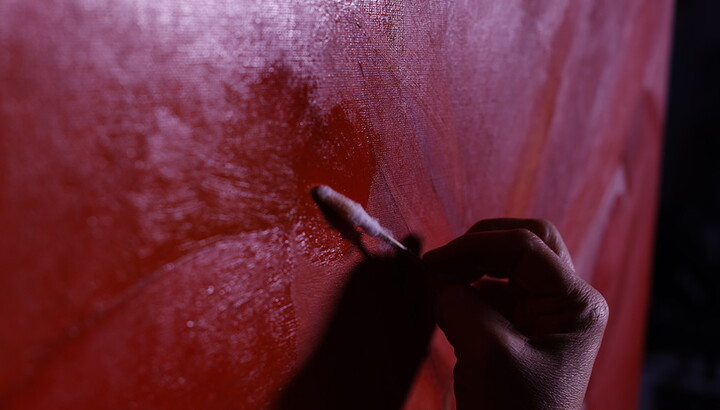The Carter Blog
Carter ARTicles
Museum jobs you might not know about (Part 1)
Sep 11, 2025
You might know that museums have curators, educators, and shop employees, but did you know that at the Carter we also have accountants, security guards, librarians, and so much more? Museums are full of jobs that many people may not know about, so in honor of next week’s College Night, we’re introducing some employees at the Carter who have interesting jobs that may need some explaining! We’ll highlight a few staff in this post and a few more in a future post.
Describe your job in two sentences.
Greg Bahr (GB): My job as a preparator is a balance of aesthetics and preservation. Our team is responsible for unpacking/packing artwork, preparing it for display (matting/framing/mount making), installing the exhibitions and all of the components you see in the galleries, including lighting, paint, signage, and exhibition furniture.
Selena Capraro (SC): I’m the associate registrar for the Museum’s collection, which involves pulling artwork from the vaults, updating artwork locations, conducting condition reports, etc. However, most of my time is spent managing our intellectual property. This involves creating contracts for copyright and image requests, negotiating and clearing rights for the Museum’s publications, and making fair use determinations and/or obtaining permissions whenever the Carter uses an image of an artwork, etc.
Maddie Hayko (MH): My job as a Technical Services Librarian includes a lot of multitasking and detail-oriented projects. The bulk of my job is to catalog the Carter's Library collection so that all Library resources have a record and can be accessible to the various communities we serve.
Allison Nicks (AN): As one of the Carter’s registrars, I manage the care and logistics of the collections. The Museum’s team of registrars track object locations, review and execute contracts, coordinate collection projects like exhibitions and installations, check condition of objects, perform collection inventory, accompany artworks as couriers, and many other things.
Chris Young (CY): As Security Manager, I protect the Carter’s staff, visitors, property, and information by providing a safe and secure environment. My position requires me to identify and mitigate potential risks to staff, visitors, property, and information.
What is your favorite thing about your job?
GB: The variation of the work from day to day or week to week. I rarely sit at a desk and get to use a variety of hands-on and visuals skills in every project.
SC: Being able to closely examine artwork, traveling with art on courier trips, and helping people with image requests to advance art scholarship.
MH: Assisting our staff with research requests, teaching the community about our amazing Library resources, and solving complicated cataloging problems that involve a little extra research.
What advice would you give to those wanting a job in the art or museum field?
GB: Be flexible and open to learning anything. Be available and reliable. Go to museum and gallery openings and form relationships with art professionals.
MH: Start small! Even just volunteering, taking part-time or internship work at a museum, gallery, art library, or other art nonprofit organization can help you get a foot in the door so you can start making valuable connections. If you are already in one of these types of jobs, make sure you are expressing to your supervisor what kind of experience you want to gain while in your role.
AN: It's important to know all the institutions in your area and keep track of possible opportunities. Check their job boards but also look for volunteer or internship opportunities. It’s easier to get an interview if they know you already. There are also professional organizations like ARCS (Association of Registrars and Collection Specialist) that post lots of opportunities all over the country from entry level to mid-career.
Is there an unexpected skill that you need to do your job?
GB: A well-rounded knowledge of an assortment of topics. As preparators, we are constantly problem solving and drawing from a wide range of information from other industries.
AN: A registrar needs to be hyper-organized. If you own a label maker, have a color-coded closet, or your personal library is alphabetized by author, you may be an excellent future registrar.
CY: Sometimes I have had to remind visitors of the rules inside the Museum while they’re enjoying their visit. It's an important skill to be able to let visitors know when their actions in a museum need to be adjusted in a way that doesn’t upset anyone.
Look for Part 2 of our Museum Jobs blog post coming soon!







